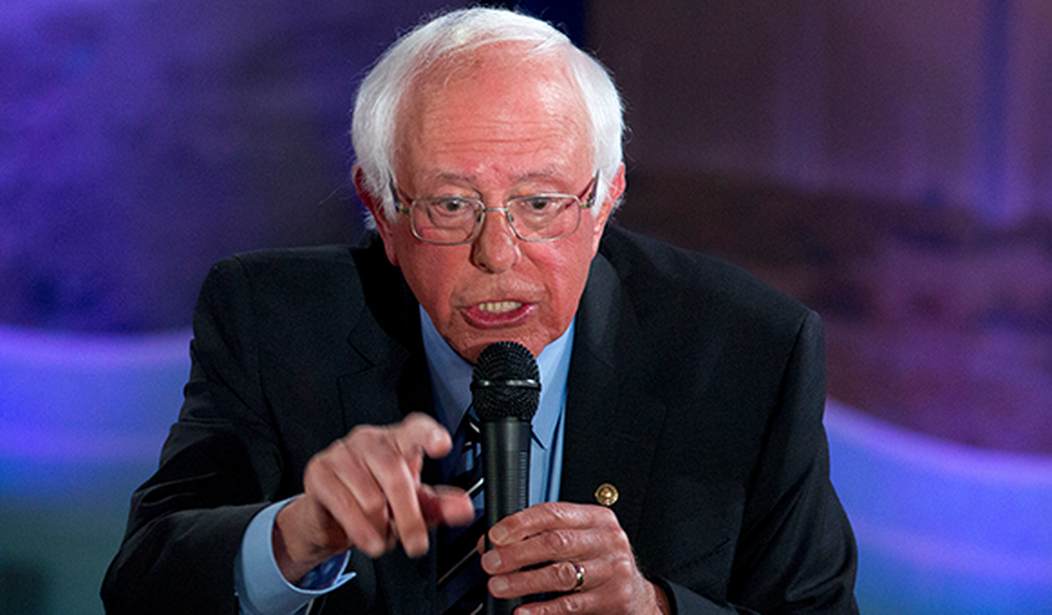The "Medicare for All" legislation that Sen. Bernie Sanders introduced in Congress expressly prohibits discrimination based on "gender identity" but not religion.
This may not be an accident.
A reasonable reading of the bill -- which is neither succinctly nor precisely written -- raises the question of whether it would still be possible for Catholic (and other religious) hospitals to continue operating within its single-payer system.
On April 10, 2019, Sanders introduced S. 1129, his "Medicare for All" bill. Title II of this bill enumerates the "comprehensive benefits" it would cover. Item No. 7 is: "Comprehensive reproductive, maternity, and newborn care."
On May 15, 2019, Sanders sent out a tweet eliminating any confusion about what his bill meant by "comprehensive reproductive" care.
"Abortion is health care," Sanders said. "When we pass Medicare for All, we will be guaranteeing a woman's right to control her own body by covering comprehensive reproductive care, including abortion."
Sanders also included language in the bill that eliminates the Hyde Amendment, which currently prohibits federal funding for most abortions.
So, under the plan, the United States would go from a country where the central government pays for almost no abortions to one where it pays for all abortions.
How might this affect religious freedom?
Section 103 of Sanders' bill is ironically entitled "Freedom of Choice." It says: "Any individual entitled to benefits under this Act may obtain health services from any institution, agency, or individual qualified to participate under this act."
Recommended
So, Americans in this single-payer system will be able to go to "any institution" that is "qualified to participate under this act."
What are those institutions? How do they become "qualified to participate?" What "benefits" can they refuse to provide?
Section 104(a) specifically cites 11 things a "participating provider" or "any entity conducting, administering, or funding a health program" cannot use as the "basis" for discriminating against someone seeking the benefits the plan covers.
"No person," it says, "shall, on the basis of race, color, national origin, age, disability, or sex, including sex stereotyping, gender identity, sexual orientation, and pregnancy and related medical conditions (including termination of pregnancy), be excluded from participation in, be denied the benefits of, or be subjected to discrimination by any participating provider as defined in section 301, or any entity conducting, administering, or funding a health program or activity, including contracts of insurance, pursuant to this Act."
The 11 things specifically cited here that are prohibited from being the "basis" of discrimination include: No. 1: "race," No. 2: "color," No. 3: "national origin," No. 4: "age," No. 5: "disability," No. 6: "sex," No. 7: "sex stereotyping," No. 8: "gender identity," No. 9: "sexual orientation," No. 10: "pregnancy" and No. 11: "termination of pregnancy."
They do not include religion.
If, under the Sanders plan, a health care provider is not expressly prohibited from discriminating against a patient on the basis of religion, is the government expressly prohibited from discriminating against a provider because of the provider's religion?
Section 301, which is cited in the section 104 antidiscrimination rule, describes "Provider Participation and Standards."
"An individual or other entity furnishing any covered service under this Act," it says, "is not a qualified provider unless the individual or entity ... has filed with the (HHS) Secretary a participation agreement described in subsection (b)."
So, what does subsection (b) say are the requirements for a "participation agreement"?
"A participation agreement described in this subsection between the Secretary and a provider," it says, "shall provide at least for the following: (A) Services to eligible persons will be furnished by the provider without discrimination, in accordance with section 104(a). Nothing in this subparagraph shall be construed as requiring the provision of a type or class of services that are outside the scope of the provider's normal practice."
What does "outside the scope of the provider's normal practice" mean? Does it mean a Catholic hospital need not provide abortions because they are outside the scope of its normal practice -- even though Sanders insists that abortion is "health care" and a "woman's right"? Or does it mean a heart surgeon need not provide brain surgery because it is outside the scope of his normal practice?
The fact that the "participation agreement" will require health care institutions to provide "services to eligible persons ... without discrimination, in accordance with section 104(a)" means that providers with a "participation agreement" cannot discriminate on the basis of "gender identity" or "termination of pregnancy."
Does that mean the Sanders plan would require Catholic hospitals to provide terminations of pregnancy in order to secure a "participation agreement" qualifying them to work in this single-payer health care system?
At 10:31 am on Tuesday, Feb. 25, 2020, I sent Sanders' Senate spokesperson three questions by email. I then spoke to him on the phone to alert him to the fact that I had sent these questions.
They were:
1: "Does Sen. Sanders' 'Medicare-for-all' bill prohibit discrimination based on religion -- just as it prohibits discrimination based on 'gender identity' and 'pregnancy termination'? If so, what is the specific language in the bill (that) prohibits discrimination based on religion?"
2: "Does the bill allow Catholic hospitals that refuse to perform 'termination of pregnancy' procedures (n.b. abortions) to be qualified providers who continue to provide health care under Sen. Sanders's 'Medicare-for-all' program? If so, is there language in the bill that specifically spells out this exception for religious hospitals and what is that language?"
3: "If the bill does not include specific language that exempts hospitals and health-care providers from engaging in activities that violate their religious or moral beliefs, why does it not include such language?"
By 6 p.m. on Tuesday, Sanders' office had not responded -- despite multiple follow-up emails and voice messages.
Terence P. Jeffrey is the editor in chief of CNSnews.com.

























Join the conversation as a VIP Member